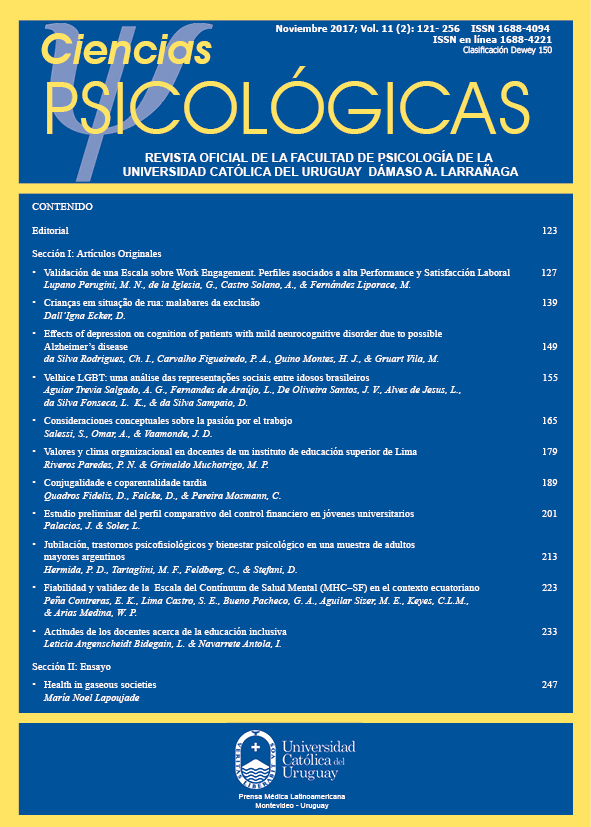Efectos de la depresión en los cambios cognitivos del enfermo con trastorno neurocognitivo leve debido a probable enfermedad de Alzheimer
DOI:
https://doi.org/10.22235/cp.v11i2.1486Palabras clave:
Alzheimer’s disease, cognition, behavior, depression, neurocognitive disorderResumen
Objective: To identify the level of the relationship between depression and cognitive functions of early-stage Alzheimer’s patient. Theoretical framework: Depression is a risk factor for dementia and consequently Alzheimer’s disease (AD), due to loss of memory, which tends to be associated with difficulties in orientation, learning, and recognition. Methodology: A total of 142 older adults participated in this study. Participants were divided into two groups, with and without a clinical diagnosis of Alzheimer’s disease and depression. Participants were evaluated through the application of the Beck Depression Inventory-II (BDI-II) and the Folstein Mini-Mental State Exam (MMSE). Results: We found statistically significant effects between cognition and depression in older adults with early-stage AD. Conclusions: We conclude that there is a high possibility of cognitive changes of patients with Alzheimer’s, when their disease is associated with depression. Furthermore, the results suggest cognition is responsible for the behavioral alterations of the patient, as a consequence of worsening depression.
Descargas
Citas
Alzheimer’s Disease International. (2009). World Alzheimer Report 2009. London: Alzheimer’s Disease International.
Beck, A. T., Steer, R. A., y Brown, G. K. (1996). BDI-II. Beck Depression Inventory- Second Edition. Manual. San Antonio, TX: The Psychological Corporation.
Beck, A. T., Ward, C. H., Mendelson, M., Mock, J., Erbaugh, J. (1961). An inventory for measuring depression. Archives of General Psychiatry, 4, 561-571.
Carmen, M., Freyre, B. M., & Hernández-Guzmán, L. (2012). El Inventario de Depresión de Beck: Su validez en población adolescente. Terapia psicológica, 30(1), 5-13.
Folstein, M. F., Folstein, S. E., McHugh, P.R. (1975). Mini-Mental State: a practical method for grading the cognitive state of patients for clinician. Journal Psychiatric Research, 12, 189-198.
Instituto Nacional de Estadística y Geografía (INEGI) (2014). Perfil sociodemográfico de adultos mayores. México: INEGI.
Instituto Nacional de las Personas Adultas Mayores (INAPAM) (2011). Encuesta Nacional sobre discriminación en México. México: INAPAM
Rodrigues, C. (2015). Personalidad de Alzheimer – conducta y estado psicológico. España: Publicia.
Rodrigues, C., Castro, F. V., & Cruz Roja Española. (2014). Los cambios de personalidad en la enfermedad de Alzheimer. International Journal of Developmental and Educacional Psychology, 1(5), 177-186.
Rodrigues, C., Castro, F. V., & Gruart, M. (2014). Relación entre cognición y personalidad en enfermos con Alzheimer. International Journal of Developmental and Educational Psychology, 2(1), 187-196.
Rothi, L. J. G., Raymer, A. M., & Heilman, K. M. (1997). Limb praxis assessment. In L. J. G. Rothi & K. M. Heilman (Eds.), Apraxia: The neuropsychology of action. Brain damage, behaviour and cognition series. Hove, UK: Psychology Press.
Sistema Nacional de Vigilancia Epidemiológica (SNVE). (2011). Perfil epidemiológico del adulto mayor en México, 2010. México: Secretaria de Salud.
Synder, P. J., Jackson, C. E., Petersen, R.C., Khachaturian, A. S., Kaye, J., Albert, M. S., Weintraub, S. (2011). Assessment of cognition in mild cognitive impairment: a comparative study. Alzheimers dementia, 7(3),338-385.
Terrera, G. M., Brayne, C. & Matthews, F. (2010). One size fits all? Why we need more 346 sophisticated analytical methods in the explanation of trajectories of cognition in older age and their potential risk factors. International Psychogeriatric 22, 291-299.
Vidovich, M, & Almeida, O. P. (2011). Cognition-focused interventions for older adults: the state of play. Australasian Psychiatry, 19(4), 313-316.
















